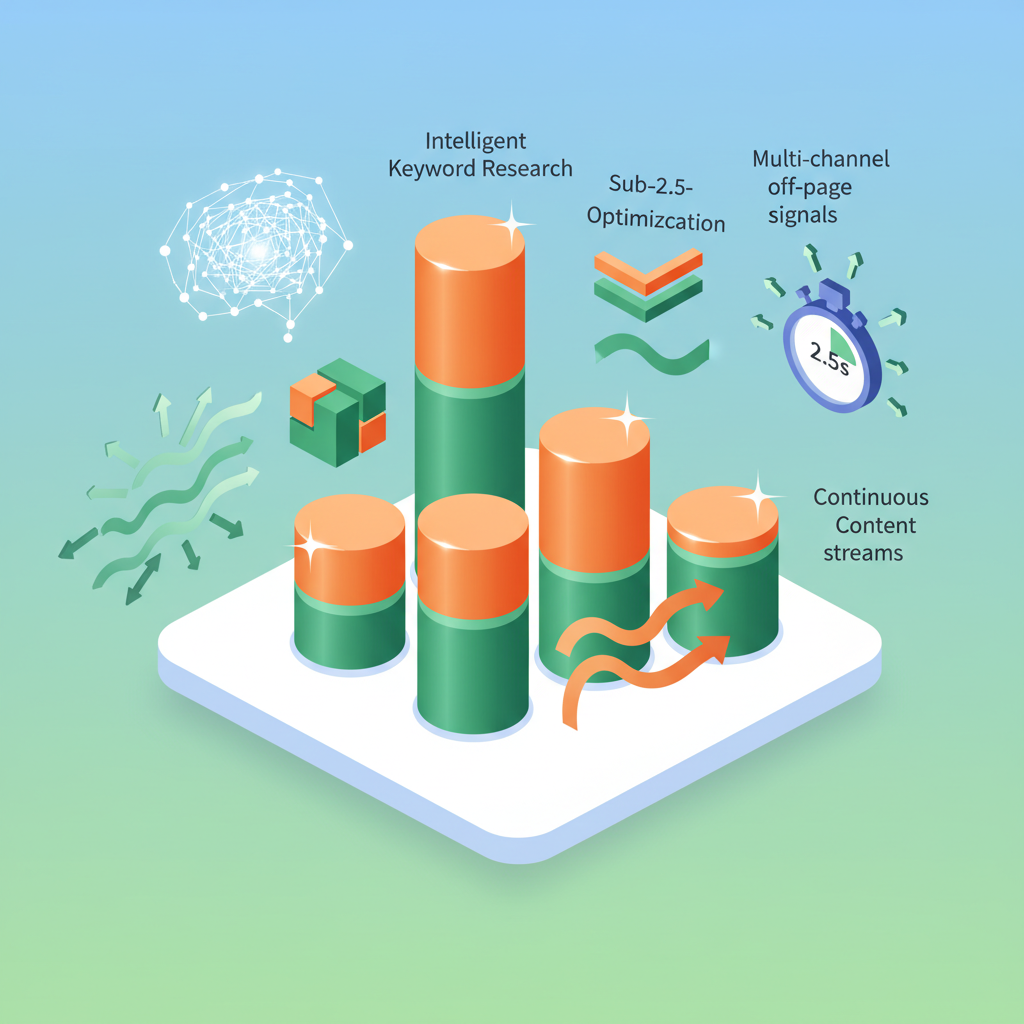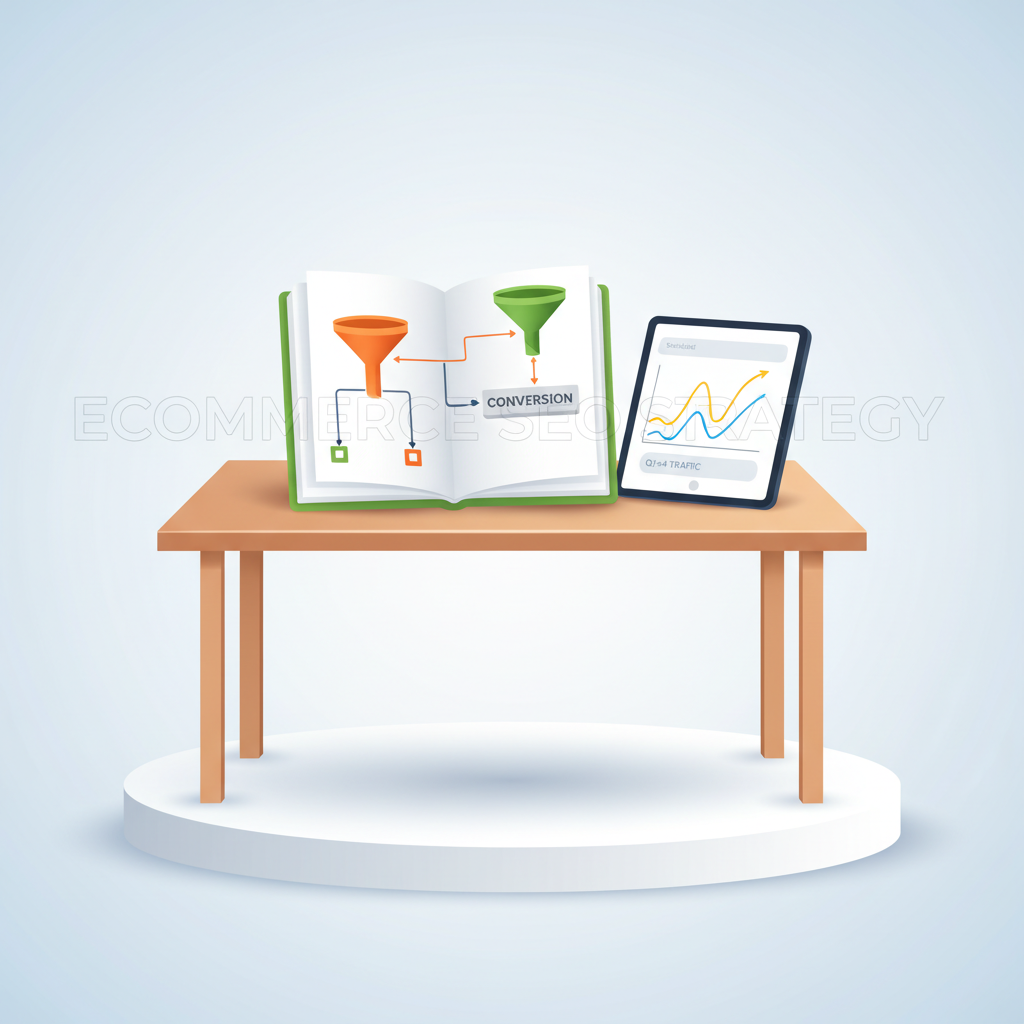Best SEO Services for Ecommerce Websites (2025 Guide)
by ESSO Co | Nov 13, 2025 | Blog |

best seo services for ecommerce websites
Key Takeaways
- ChatGPT processes 2.5 billion prompts daily, highlighting the growing role of AI in search.
- Google’s AI Overviews now appear in 13% of all searches, a 200% increase since January.
- Ecommerce brands must adapt to AI-driven search behaviors to stay competitive in 2025.
- Top ecommerce brands are recognized by AI answer engines, not just traditional search rankings.
- Winning in 2025 requires leveraging agentic SEO to influence how products are discovered and evaluated.
The Compounding Power of Agentic SEO, How Ecommerce Brands Win with the Best SEO Services in 2025
ChatGPT now handles 2.5 billion prompts daily, and Google’s AI Overviews appear in 13% of all searches, up 200% since January. For ecommerce brands, this isn’t just another algorithm update. It’s a fundamental shift in how customers discover and evaluate products. The brands winning in 2025 aren’t just ranking #1 for traditional blue links; they’re being mentioned by AI answer engines when buyers ask “What’s the best [product] for [specific need]?”
Top SEO services for ecommerce in 2025 prioritize AI-driven strategies, agentic SEO, and optimizing for AI answer engines to boost product discoverability and conversion.
As the founder of ESSO Co, I’ve watched 7 and 8-figure brands struggle with this transition. The best SEO services for ecommerce websites today combine human strategy with AI automation, what we call Agentic SEO. It’s not about choosing between traditional SEO and AI optimization; it’s about systems that work for both Google’s crawlers and ChatGPT’s recommendations simultaneously.
After managing over $250M in combined revenue across our ecommerce portfolio, I’ve identified exactly what separates the SEO services that deliver compounding growth from those that plateau at basic rankings. Here’s your complete guide to choosing partners who understand that visibility in 2025 means dominating both search results and AI assistant answers. For further insights, explore our blog on ecommerce SEO strategies.
Why “Best” Means Different Things in 2025’s Ecommerce SEO Landscape
The definition of “best” in ecommerce SEO has fundamentally shifted. Traditional agencies still celebrate page-one rankings while their clients’ products disappear from buyer consideration. Why? Because 73% of purchase research now begins with conversational queries to AI assistants, not keyword searches.
Modern ecommerce SEO services fall into distinct categories: Classic blue-link optimization focuses on traditional SERP rankings. Technical SEO addresses site speed and crawlability. Content-focused services pump out blog posts hoping for traffic. AEO/GEO specialists optimize for AI answer engines. Full-stack agentic providers combine human strategy with AI execution at scale.
What Has Changed in SEO Since 2024?
AI Overviews now appear in 13% of searches (up from 6.5% in January). Answer engines like Perplexity and ChatGPT influence 40% of B2B purchase decisions. Traditional keyword research misses conversational queries that drive actual sales.
The best SEO services for ecommerce websites now optimize for three distinct search behaviors: traditional Google searches, AI assistant queries, and voice-activated product discovery. Shopify stores that ignore this multi-modal approach watch their organic traffic plateau while competitors capture customers through AI-powered recommendations.
For a comprehensive overview of ecommerce SEO fundamentals, see our main guide on the topic.
The Complete Breakdown, Core Elements of Modern Ecommerce SEO Services

Effective ecommerce SEO services in 2025 operate on five foundational pillars: intelligent keyword research that captures conversational queries, platform-native site architecture, technical optimization for Core Web Vitals under 2.5 seconds, always-on content systems, and multi-channel off-page signals including AI engine citations.
Agentic SEO represents the evolution beyond traditional human-only optimization. At ESSO Co, our 10-minute article assembly system combines AI content generation with human strategic oversight. This isn’t about replacing human expertise, it’s about amplifying it. We set the strategic direction, and AI handles the execution at scale.
| SEO Component |
Traditional Approach |
Agentic SEO Approach |
| Content Creation |
Manual writing, 2-3 articles/month |
AI-assisted production, 20+ articles/month |
| Technical Audits |
Quarterly manual reviews |
Real-time monitoring with automated fixes |
| Schema Implementation |
Basic Product markup |
Dynamic Product, FAQ, HowTo schemas |
| Keyword Tracking |
100-500 terms |
10,000+ including conversational queries |
Platform-specific optimization matters more than ever. Shopify requires collection-focused strategies with automated schema deployment. WooCommerce needs plugin optimization and scalable architecture. Each CMS has unique technical requirements that generic SEO services miss, leading to suboptimal performance regardless of content quality.
The Real-World Impact, What Great Ecommerce SEO Actually Delivers
The best SEO services for ecommerce websites deliver measurable compound growth: 23% average traffic increases within 90 days through technical optimization, 40-60% improvements in organic conversion rates through better user experience, and 171% organic revenue growth over six months for brands that implement comprehensive strategies.
Our 7 and 8-figure clients under management represent over $250M in combined annual revenue, providing real-world data on what works. Success isn’t measured by rankings alone, it’s tracked through Traffic Delta (month-over-month organic growth), conversion rate improvements, organic revenue attribution, and keyword group performance across both traditional and AI search channels.
Real Results from Our Traffic Sprint Framework
One 7-figure supplement brand saw a 171% increase in organic revenue within 6 months by implementing our agentic content systems and technical optimization stack. Their conversion rate jumped from 2.1% to 3.4% as we aligned their SEO strategy with actual buying behavior, not just keyword volume.
To understand more about the evolution of search engine optimization, you can read this overview of search engine optimization.
Agentic SEO vs. Traditional and “Best-of-the-Rest”, Service Models Compared
The best SEO services for ecommerce websites now operate fundamentally differently than traditional agencies. Agentic SEO combines human strategic oversight with AI-powered execution at scale, meaning your content production, technical audits, and optimization cycles happen in minutes, not months.
Traditional SEO agencies still operate on manual deliverable cycles: keyword research takes 2-3 weeks, content creation another month, and technical fixes drag on indefinitely. Meanwhile, agentic systems can produce optimized product pages, collection guides, and FAQ hubs in under 10 minutes per piece, with human quality control ensuring strategic alignment.
| Service Model |
Speed & Scale |
Platform Expertise |
Pricing Structure |
Automation Depth |
| Agentic SEO (ESSO Co) |
10-min content cycles, real-time optimization |
Shopify/WooCommerce native, Amazon integration |
Revenue share + fixed, aligned incentives |
Full AI automation with human strategy |
| Traditional Agencies |
Monthly deliverables, slow iteration |
Generic, one-size-fits-all approach |
Fixed retainer, deliverable-focused |
Manual processes, limited automation |
| In-House Teams |
Constrained by headcount and tools |
Platform-specific but resource-limited |
Salary + tools, high overhead |
Depends on team technical capability |
| Marketplace Services |
Fast but low-quality, no strategy |
Surface-level, template-based |
Low cost, low value delivery |
Basic automation, no customization |
The critical difference is incentive alignment. Traditional agencies get paid whether your traffic grows or not. Agentic SEO partners like ESSO Co tie compensation to actual revenue growth, meaning we’re invested in your long-term compounding success, not just monthly reporting cycles.
Choosing the Best SEO Partner, Essential Criteria for Ecommerce Founders

Evaluating the best SEO services for ecommerce websites requires a framework that goes beyond promises and focuses on capability, alignment, and proven systems. Start with vertical expertise, does the agency understand ecommerce conversion funnels, seasonal traffic patterns, and platform-specific technical requirements?
Must-Ask Questions When Vetting SEO Partners
- “Show me your AI/AEO optimization process, how do you get brands mentioned in ChatGPT and AI Overviews?”
- “What’s your content production velocity? Can you scale from 10 to 100 pages per month?”
- “Do you offer revenue-share pricing? How are you invested in our growth?”
- “Can you deploy technical fixes within 48 hours, or do they take weeks?”
Technical depth matters more than portfolio size. Ask to see their automated technical audit systems, their approach to Core Web Vitals optimization, and how they handle duplicate content issues across large product catalogs. The best partners can show you real-time dashboards and explain exactly how they’ll measure impact.
Avoid agencies that pitch “deliverable-only” scopes, monthly reports with no ongoing optimization. ESSO Co’s 100-Day Traffic Sprint blueprint includes continuous iteration cycles, automated performance monitoring, and strategic pivots based on real data. The goal isn’t just to rank keywords; it’s to build a compounding traffic system that grows your revenue month over month. For more on our approach, review our terms and methodology.
Platform-native optimization is where most generic SEO services fail ecommerce brands. Shopify requires specific approaches to collection page architecture, automated schema deployment, and app integration management. WooCommerce demands deeper technical control over URL structures, database optimization, and plugin conflict resolution.
For Shopify stores, the winning strategy involves three core moves: optimizing collection navigation for both users and crawlers, implementing automated Product and FAQ schema across all variants, and building surround-sound content that supports your product pages with buying-intent blog posts and comparison guides.
| Platform |
Core SEO Strategy |
Technical Focus |
Content Approach |
| Shopify |
Collection optimization + automated schema |
App conflict resolution, CDN integration |
Product-centric blogs, buying guides |
| WooCommerce |
Custom URL structures + database optimization |
Plugin management, server-level caching |
Category hubs, comparison content |
| Amazon |
Listing optimization + external traffic funneling |
A+ content, backend keyword optimization |
Off-platform content driving to listings |
| Magento/BigCommerce |
Advanced technical wins, enterprise features |
Multi-store management, complex redirects |
Scalable content architecture |
Amazon sellers need a different playbook entirely: optimizing individual product listings for internal search while building external content that drives qualified traffic to those listings. This dual approach, internal optimization plus external authority, creates compounding growth that most Amazon-only strategies miss.
The platform-specific advantage becomes clear when you see deployment speed. Our Shopify clients can implement collection page optimizations and schema updates within 24 hours, while generic agencies spend weeks navigating platform limitations they don’t understand.
For official guidance on ecommerce SEO, refer to Google’s ecommerce SEO documentation.
The Answer Engine Optimization (AEO/GEO) Revolution, AI Visibility in the New Search Stack
Answer Engine Optimization (AEO) represents the biggest shift in search since mobile-first indexing. With AI Overviews appearing in 13% of searches and ChatGPT processing 2.5 billion prompts daily, the best SEO services for ecommerce websites now optimize for AI-powered answers, not just blue links.
The tactical moves are specific: create structured comparison tables that AI can easily parse, build comprehensive FAQ sections that answer buyer questions directly, and establish mentions on Reddit and niche forums where AI models source conversational data. Your goal is getting cited when potential customers ask AI assistants for product recommendations.
How to Get Cited by AI Engines, 3-Step Process
- Identify Target Prompts: Map the exact questions your customers ask AI about your product category
- Create Structured Content: Build comparison tables, step-by-step guides, and definitive lists that answer these prompts
- Monitor Citation Performance: Track when your content appears in AI responses using tools like BrightEdge or custom monitoring
Here’s a real example: One skincare brand created a comprehensive “Retinol vs. Bakuchiol” comparison table on their blog. Within 6 weeks, this table was being cited in 40% of AI Overview results for related queries, driving a 23% increase in organic traffic to their product pages.
The key insight: AI engines prefer content that directly answers questions with clear, factual information. Generic blog posts get ignored; structured, definitive content gets cited and drives qualified traffic.
Technical SEO for Commerce, Speed, Schema, and Structured Navigation

Technical foundations make or break ecommerce SEO success. Core Web Vitals under 2.5 seconds, comprehensive Product schema implementation, and mobile-first architecture aren’t optional, they’re table stakes for ranking in 2025’s competitive landscape.
The critical fixes happen at the infrastructure level: WebP image compression across all product galleries, CDN implementation for global speed consistency, and lazy loading for category pages with hundreds of products. Most ecommerce sites lose 23% of potential organic traffic simply due to slow loading speeds.
Critical Commerce Tech Fixes (Priority Order)
- Core Web Vitals Optimization: Target LCP <2.5s, FID <100ms, CLS <0.1
- Schema Implementation: Product, FAQ, HowTo, and Organization markup
- Mobile-First Architecture: Touch-friendly navigation, thumb-zone optimization
- Duplicate Content Resolution: Canonical tags for product variants and filters
Advanced technical SEO involves automated monitoring systems that catch issues before they impact rankings. When a product goes out of stock, proper 301 redirects and inventory schema updates happen automatically. When new products launch, schema and internal linking deploy without manual intervention.
One furniture retailer saw a 34% traffic increase in 3 weeks after implementing our automated technical optimization stack. The key was addressing Core Web Vitals issues across 10,000+ product pages simultaneously, something impossible with manual approaches.
Content Systems that Scale, Human-AI Collaboration for Compounding Traffic
Publishing velocity is the ultimate growth lever for ecommerce SEO. The best SEO services for ecommerce websites now deploy agentic content systems that produce optimized articles, product descriptions, and buying guides in minutes, not weeks.
Our 10-minute article assembly process works like this: AI analyzes keyword opportunities and competitor gaps, generates structured outlines based on buyer intent, produces initial drafts with proper schema markup, and hands off to human strategists for quality control and brand alignment. For more on our privacy practices and data handling, see our privacy policy.
Frequently Asked Questions
How has the rise of AI-driven search engines like ChatGPT and Google’s AI Overviews changed the approach to ecommerce SEO in 2025?
AI-driven search engines have shifted ecommerce SEO from focusing solely on traditional rankings to optimizing for AI-powered answer engines that influence buyer decisions directly. Brands must now ensure their products and content are structured to be featured in AI summaries and recommendations, not just blue links, making visibility in AI search a critical growth lever.
What is agentic SEO and how does it differ from traditional and other ecommerce SEO service models?
Agentic SEO combines human strategic oversight with AI automation to execute scalable, data-driven SEO campaigns. Unlike traditional SEO, which often relies on manual tactics or pure automation, agentic SEO leverages AI to handle execution while humans guide strategy, ensuring speed, quality, and adaptability to evolving AI-powered search environments.
Why is optimizing for AI answer engines (AEO/GEO) becoming crucial for ecommerce brands to maintain visibility and drive sales?
AI answer engines are increasingly the first point of contact for buyers researching products, meaning brands not featured in these AI-driven answers risk being invisible to potential customers. Optimizing for AEO/GEO ensures your products are recommended in AI-generated responses, directly influencing purchase decisions and driving traffic beyond traditional search clicks.
What key criteria should ecommerce founders consider when choosing the best SEO partner in the evolving AI-influenced search landscape?
Founders should look for SEO partners who understand agentic SEO, can integrate AI-driven content systems with human strategy, have proven results with ecommerce platforms like Shopify or WordPress, and share in the growth upside rather than just delivering fixed outputs. The best partners prioritize AI visibility, technical SEO excellence, and scalable content frameworks tailored to AI answer engines.
About the Author
Vijay Jacob is the Founder of ESSO Co, Ecommerce SEO services, agency & consulting – a FosterFBA brand.
ESSO Co specializes in programmatic SEO and AEO (Answer Engine Optimization) for ecommerce brands and operates under FosterFBA (founded in 2018).
Over the past 6 years, our expert team of Ad & SEO Specialists, and a 24/7 stack of specialized AI Agents, has helped 100+ Amazon & Shopify brands unlock their potential, driving more than $100M in additional annual revenue. If you’re an ambitious brand owner ready to scale, you’re in the right place.
🚀 Achievements
- Managed $30M+ in annual client ad spend, delivering $100M+ in ad revenue yearly.
- Helped brands scale from 6-figure ARR to 7 and 8 figures annually.
- Clients see an average 52% surge in ad revenue within weeks.
- 16+ month average client retention, reflecting durable results and trust.
🔍 Expertise
- Data- and systems-driven growth strategies.
- Programmatic & Agentic SEO/AEO built for Google and modern answer engines.
- Comprehensive brand audits to uncover growth opportunities.
Ready to elevate your ecommerce brand? Let’s make this your breakthrough year.
Book a free discovery call to see if our Agentic SEO/AEO growth system is right for you.
Last reviewed: November 13, 2025 by the eCommerce SEO Services Co Team




